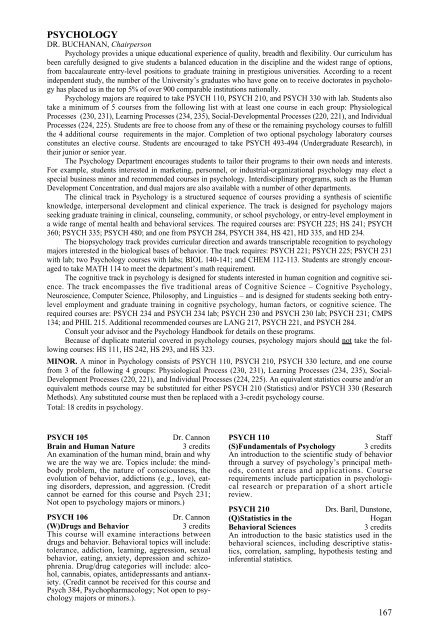You also want an ePaper? Increase the reach of your titles
YUMPU automatically turns print PDFs into web optimized ePapers that Google loves.
PSYCHOLOGY<br />
DR. BUCHANAN, Chairperson<br />
Psychology provides a unique educational experience <strong>of</strong> quality, breadth and flexibility. Our curriculum has<br />
been carefully designed to give students a balanced education in the discipline and the widest range <strong>of</strong> options,<br />
from baccalaureate entry-level positions to graduate training in prestigious universities. According to a recent<br />
independent study, the number <strong>of</strong> the <strong>University</strong>’s graduates who have gone on to receive doctorates in psychology<br />
has placed us in the top 5% <strong>of</strong> over 900 comparable institutions nationally.<br />
Psychology majors are required to take PSYCH 110, PSYCH 210, and PSYCH 330 with lab. Students also<br />
take a minimum <strong>of</strong> 5 courses from the following list with at least one course in each group: Physiological<br />
Processes (230, 231), Learning Processes (234, 235), Social-Developmental Processes (220, 221), and Individual<br />
Processes (224, 225). Students are free to choose from any <strong>of</strong> these or the remaining psychology courses to fulfill<br />
the 4 additional course requirements in the major. Completion <strong>of</strong> two optional psychology laboratory courses<br />
constitutes an elective course. Students are encouraged to take PSYCH 493-494 (Undergraduate Research), in<br />
their junior or senior year.<br />
<strong>The</strong> Psychology Department encourages students to tailor their programs to their own needs and interests.<br />
For example, students interested in marketing, personnel, or industrial-organizational psychology may elect a<br />
special business minor and recommended courses in psychology. Interdisciplinary programs, such as the Human<br />
Development Concentration, and dual majors are also available with a number <strong>of</strong> other departments.<br />
<strong>The</strong> clinical track in Psychology is a structured sequence <strong>of</strong> courses providing a synthesis <strong>of</strong> scientific<br />
knowledge, interpersonal development and clinical experience. <strong>The</strong> track is designed for psychology majors<br />
seeking graduate training in clinical, counseling, community, or school psychology, or entry-level employment in<br />
a wide range <strong>of</strong> mental health and behavioral services. <strong>The</strong> required courses are: PSYCH 225; HS 241; PSYCH<br />
360; PSYCH 335; PSYCH 480; and one from PSYCH 284, PSYCH 384, HS 421, HD 335, and HD 234.<br />
<strong>The</strong> biopsychology track provides curricular direction and awards transcriptable recognition to psychology<br />
majors interested in the biological bases <strong>of</strong> behavior. <strong>The</strong> track requires: PSYCH 221; PSYCH 225; PSYCH 231<br />
with lab; two Psychology courses with labs; BIOL 140-141; and CHEM 112-113. Students are strongly encouraged<br />
to take MATH 114 to meet the department’s math requirement.<br />
<strong>The</strong> cognitive track in psychology is designed for students interested in human cognition and cognitive science.<br />
<strong>The</strong> track encompasses the five traditional areas <strong>of</strong> Cognitive Science – Cognitive Psychology,<br />
Neuroscience, Computer Science, Philosophy, and Linguistics – and is designed for students seeking both entrylevel<br />
employment and graduate training in cognitive psychology, human factors, or cognitive science. <strong>The</strong><br />
required courses are: PSYCH 234 and PSYCH 234 lab; PSYCH 230 and PSYCH 230 lab; PSYCH 231; CMPS<br />
134; and PHIL 215. Additional recommended courses are LANG 217, PSYCH 221, and PSYCH 284.<br />
Consult your advisor and the Psychology Handbook for details on these programs.<br />
Because <strong>of</strong> duplicate material covered in psychology courses, psychology majors should not take the following<br />
courses: HS 111, HS 242, HS 293, and HS 323.<br />
MINOR. A minor in Psychology consists <strong>of</strong> PSYCH 110, PSYCH 210, PSYCH 330 lecture, and one course<br />
from 3 <strong>of</strong> the following 4 groups: Physiological Process (230, 231), Learning Processes (234, 235), Social-<br />
Development Processes (220, 221), and Individual Processes (224, 225). An equivalent statistics course and/or an<br />
equivalent methods course may be substituted for either PSYCH 210 (Statistics) and/or PSYCH 330 (Research<br />
Methods). Any substituted course must then be replaced with a 3-credit psychology course.<br />
Total: 18 credits in psychology.<br />
PSYCH 105 Dr. Cannon<br />
Brain and Human Nature 3 credits<br />
An examination <strong>of</strong> the human mind, brain and why<br />
we are the way we are. Topics include: the mindbody<br />
problem, the nature <strong>of</strong> consciousness, the<br />
evolution <strong>of</strong> behavior, addictions (e.g., love), eating<br />
disorders, depression, and aggression. (Credit<br />
cannot be earned for this course and Psych 231;<br />
Not open to psychology majors or minors.)<br />
PSYCH 106 Dr. Cannon<br />
(W)Drugs and Behavior 3 credits<br />
This course will examine interactions between<br />
drugs and behavior. Behavioral topics will include:<br />
tolerance, addiction, learning, aggression, sexual<br />
behavior, eating, anxiety, depression and schizophrenia.<br />
Drug/drug categories will include: alcohol,<br />
cannabis, opiates, antidepressants and antianxiety.<br />
(Credit cannot be received for this course and<br />
Psych 384, Psychopharmacology; Not open to psychology<br />
majors or minors.).<br />
PSYCH 110 Staff<br />
(S)Fundamentals <strong>of</strong> Psychology 3 credits<br />
An introduction to the scientific study <strong>of</strong> behavior<br />
through a survey <strong>of</strong> psychology’s principal methods,<br />
content areas and applications. Course<br />
requirements include participation in psychological<br />
research or preparation <strong>of</strong> a short article<br />
review.<br />
PSYCH 210 Drs. Baril, Dunstone,<br />
(Q)Statistics in the Hogan<br />
Behavioral Sciences 3 credits<br />
An introduction to the basic statistics used in the<br />
behavioral sciences, including descriptive statistics,<br />
correlation, sampling, hypothesis testing and<br />
inferential statistics.<br />
167
















